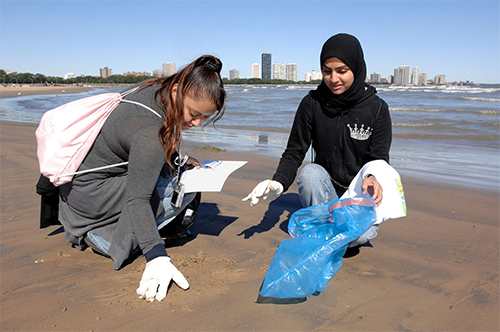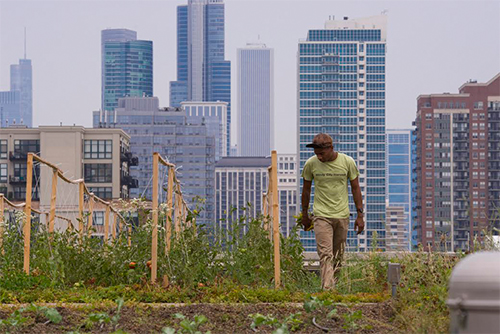Updated April 17, 2018
We all want to protect the planet for the next generation, and there’s never been a more important time to dedicate yourself to environmental causes. In honor of Earth Day (April 22), here’s a look at some of Chicagoland’s best eco-friendly charities.
Active Transportation Alliance
In 2016 Chicago was named the No. 1 bicycling city in America by Bicycling magazine. That’s thanks in large part to the efforts of the Active Transportation Alliance (ATA). Its 7,000 members work hard to promote biking, walking and public transit in the Chicago area. They push for walkable communities and safer biking, and fight for funding to keep public transit affordable while improving and expanding service.
“We take credit, in part, for tripling the number of people biking in Chicago since 2000,” says Ted Villaire, ATA’s communications director. “Early on, we asked the city of Chicago to launch a bike sharing service in Chicago. Now, with more than 580 stations and 5,800 bikes available in the city, Evanston and Oak Park, Divvy has provided more than 10 million rides and has become the second largest bike-share system in the United States.”
ATA has also campaigned successfully for expanding numerous suburban trails, including the North Branch Trail, the Skokie Valley Trail and the Cal-Sag Trail.

You’ll see around a thousand Active Transportation Alliance volunteers working hard on May 27 at their biggest annual fundraiser, Bike the Drive, when bicyclists get to have Lake Shore Drive all to themselves.
Lincoln Park Zoo
This lakefront gem, one of the country’s few free zoos, gets a high three-star rating from Charity Navigator, a website scoring nonprofits for fiscal responsibility and best practices to minimize the chance of unethical activities.
Lincoln Park Zoo is a leader in wildlife conservation, both in far-off places and right here at home. The zoo’s scientists study great apes in the Congo and lions and zebras in the Serengeti. They also monitor wildlife in Chicago via the zoo’s Urban Wildlife Institute. Through research and advocacy, the Urban Wildlife Institute works to minimize the impact of human development on wildlife, using conflict management models that can be replicated in cities across the globe.
One of the Institute’s unique initiatives is Chicago Wildlife Watch, a crowd-sourcing science project showing that wildlife can be found throughout the city and suburbs. Chicago Wildlife Watch has more than 100 motion-triggered cameras set up throughout the area, taking pictures every 30 seconds when they detect movement. So far, the cameras have captured more than a million images of rare birds, foxes, coyotes, deer, bats and more.
Alliance for the Great Lakes

You already know what a treasure the lakefront is. Known by some as the Third Coast, Lake Michigan is our area’s greatest natural resource. Although the Alliance is dedicated to protecting and restoring all five of the Great Lakes, it’s headquartered in Chicago and has been awarded the top four-star rating by Charity Navigator.
Since 1991, their Adopt-A-Beach program has collected tons of garbage, as well as data, from waterfronts in all eight Great Lake states. In 2016 alone, nearly 15,000 volunteers collected more than 37,000 pounds of trash.
Besides cleaning up the water, the Alliance defends the Great Lakes by pursuing protective policies — making sure the right environmental laws and regulations are in place. In 2014, their hard work helped Illinois become the first state to ban the manufacture and sale of personal care products containing synthetic plastic microbeads. Used as exfoliants in many facial cleansers and soaps, the non-biodegradable plastic particles slip through sewage system filters and pile up in waterways, where they can harm wildlife. Not very pretty, is it?
Chicago Botanic Garden

It’s the crown jewel of the North Shore, but did you know the Chicago Botanic Garden (CBG) cultivates a lot more than the beautiful plants and flowers you see at their 385-acre site on Lake Cook Road? From horticulture therapy programs for vets to their Windy City Harvest program, providing fresh produce and gardening skills to underserved Chicago neighborhoods, CBG is planting seeds of positive change throughout Chicagoland.
CBG’s CEO and President Jean Franczyk has deep roots in the Chicago area, having worked as policy adviser to Mayor Richard M. Daley and chief of staff for the Chicago Board of Education. Shortly after Franczyk’s arrival, CBG opened the new Regenstein Learning Campus, home to a nature preschool, a great antidote to what’s come to be known as “nature deficit disorder.”
“Plants and nature not only make us healthy people, but contribute to a healthier planet,” says Franczyk. “There are now probably a hundred scientific studies showing the power of the natural world to improve health outcomes. Whether in little kids that suffer from attention deficit disorder to adults suffering from post-traumatic stress disorder.”
Friends of the Chicago River

Chicago River Day leads thousands of volunteers from diverse communities in clearing trash at more than 60 locations along the riverbank. And in 2016, the popular guided canoe program brought more than 2,000 paddlers out on the river, breaking a 20-year record. Next up: fighting for a continuous river trail, greater accessibility, and supporting river-sensitive design along downtown Chicago’s Riverwalk.
The Environmental Law & Policy Center is another amazing organization. Its executive director, Howard A. Learner, has spoken about how Chicagoland can lead on climate. Make It Better is also proud to have launched with Go Green Wilmette on May 1, 2007.
More from Make It Better:

